|
|
|
Sort Order |
|
|
|
Items / Page
|
|
|
|
|
|
|
| Srl | Item |
| 1 |
ID:
092465


|
|
|
|
|
| Publication |
2009.
|
| Summary/Abstract |
The use of force in international relations by the West is increasingly witnessing a greater reliance on Special Forces. This trend has profound implications for state action because Special Forces represent a very different kind of soldier and they possess the inherent ability to transgress traditional boundaries in peace and war. The development and participation of UK Special Forces in the Global War on Terror provides a microcosm of the positive and negative dimensions of using secret military units as the force of choice against insurgents and terrorists in Afghanistan, Iraq and indeed on the streets of London.
|
|
|
|
|
|
|
|
|
|
|
|
|
|
|
|
| 2 |
ID:
148797
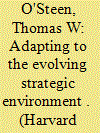

|
|
|
| 3 |
ID:
064202
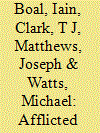

|
|
|
|
|
| Publication |
London, VERSO, 2005.
|
| Description |
xii, 211p
|
| Standard Number |
1844670317
|
|
|
|
|
|
|
|
|
|
|
|
Copies: C:1/I:0,R:0,Q:0
Circulation
| Accession# | Call# | Current Location | Status | Policy | Location |
| 049798 | 909.83/BOA 049798 | Main | On Shelf | General | |
|
|
|
|
| 4 |
ID:
117542
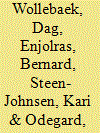

|
|
|
|
|
| Publication |
2012.
|
| Summary/Abstract |
The article examines short-term effects of terror on trust and civic engagement in Norway. Prior to the July 22, 2011 attacks, Norway ranked among the nations with the highest levels of trust and civic engagement in the world. How does a nation of trusters react to terror? Based on two web surveys conducted in March/April 2011 and August 2011 short-term effects on trust, fear, and political interest and participation are analyzed. Two competing hypotheses are explored: first, the "end-of-innocence hypothesis," which assumes that the attacks have disrupted trust and instilled a new culture of fear, and second, the "remobilization hypothesis," which assumes that the attacks have led to a reinforcement of trust and of civic values. Our results show increased interpersonal and institutional trust as well as a modest increase in civic engagement, especially among youth. Moreover, there is little increase in experienced fear within the population. Our study therefore supports the remobilization-of-trust hypothesis. Contrary to the intended aims of the attacker, the structures of trust and civic engagement seem to have been reinforced in Norwegian society. This study in part corroborates findings concerning short-term effects after September 11, 2001.
|
|
|
|
|
|
|
|
|
|
|
|
|
|
|
|
| 5 |
ID:
099549
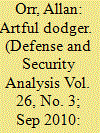

|
|
|
| 6 |
ID:
099979
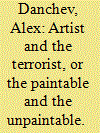

|
|
|
|
|
| Publication |
2010.
|
| Summary/Abstract |
This article is offered as a small demonstration of what art has to say about terror and violence. It focuses on the German artist Gerhard Richter and his cycle of paintings on the life and death of the homegrown terrorists of the Baader-Meinhof group, October 18, 1977 (1988). Following Richter, it explores whether atrocity is "paintable." It investigates the encounter between the artist and the terrorist and proposes that Richter's is a profound exploration of terror and counterterror in the contemporary world.
|
|
|
|
|
|
|
|
|
|
|
|
|
|
|
|
| 7 |
ID:
142544
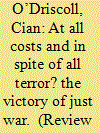

|
|
|
|
|
| Summary/Abstract |
Derived from the Latin Victoria, which itself can be traced to vino victus, meaning ‘to conquer’, victory evokes a number of close synonyms, principally conquest and triumph. It occupies an ambivalent position in respect of contemporary war. Though in some regards a concept that is essential to the very idea of combat, the notion of winning wars has acquired an ironic ring in the aftermath of two brutal world wars and the advent of nuclear weapons. Victory in war is clearly a contentious subject. Yet scholars of the just war tradition have largely ignored it. This article fills that breach by asking what, if anything, victory can mean in relation to just war? It argues that victory has an aporetic quality insofar as it appears both integral to but incompatible with the just war ethos. As such, it reveals both the limits and possibilities of just war thinking.
|
|
|
|
|
|
|
|
|
|
|
|
|
|
|
|
| 8 |
ID:
123776
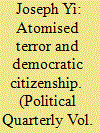

|
|
|
|
|
| Publication |
2013.
|
| Summary/Abstract |
This essay connects the 2103 Boston Bombings to the dynamics of a highly individualist, modern society. The perpetrators (Tsarnaev brothers) represent an atomized stratum of Americans, disconnected from communal institutions and organizations; socially insignificant men, ready to commit publicized, albeit isolated, acts of violence. With the exception of the World Trade Center, major terrorist attacks in the past two decades have been perpetrated by asocial, isolated individuals. An expansive security and welfare state is an inadequate response to atomized terror and is potentially problematic for our liberties. An approach more consistent with security and freedom is to nurture the rights and responsibilities of democratic citizenship.
|
|
|
|
|
|
|
|
|
|
|
|
|
|
|
|
| 9 |
ID:
108693
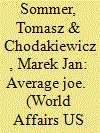

|
|
|
| 10 |
ID:
127803
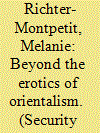

|
|
|
|
|
| Publication |
2014.
|
| Summary/Abstract |
Contrary to commonsense understandings of torture as a form of information-gathering, confessions elicited through the use of torture produce notoriously unreliable data, and most interrogation experts oppose it as a result. With a focus on the US carceral regime in the War on Terror, this article explores the social relations and structures of feelings that make torture and other seemingly ineffective and absurd carceral practices possible and desirable as technologies of security. While much of international relations scholarship has focused on the ways in which affective and material economies of Orientalism are central to representations of the 'terrorist' threat, this article connects the carceral violences in the racialized lawfare against Muslimified people and spaces to the capture and enslavement of Africans and the concomitant production of the figure of the Black body as the site of enslaveability and openness to gratuitous violence. The article further explores how these carceral security practices are not simply rooted in racial-sexual logics of Blackness, but themselves constitute key sites and technologies of gendered and sexualized race-making in this era of 'post-racial triumph' (HoSang and LaBennett, 2012: 5).
|
|
|
|
|
|
|
|
|
|
|
|
|
|
|
|
| 11 |
ID:
074513
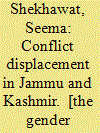

|
|
|
|
|
| Publication |
Jammu, Saksham Books International, 2006.
|
| Description |
xv, 221p.
|
| Standard Number |
8189478044
|
|
|
|
|
|
|
|
|
|
|
|
Copies: C:1/I:0,R:0,Q:0
Circulation
| Accession# | Call# | Current Location | Status | Policy | Location |
| 051792 | 303.66082/SHE 051792 | Main | On Shelf | General | |
|
|
|
|
| 12 |
ID:
096961
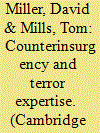

|
|
|
|
|
| Publication |
2010.
|
| Summary/Abstract |
In this paper the authors draw upon the tradition of Power Structure Research to analyse the increased interpenetration of the military and the social sciences, particularly the recruitment of anthropologists and the adoption and adaptation of counterinsurgency strategies. It is argued that such actors should be understood not as disinterested 'experts' but as being organically embedded in a military-industrial-academic complex. The paper considers a number of contemporary examples as well as considering the historical roots of these trends. It is argued that this interpenetration violates the ethical norms of the academy and the moral and social responsibilities of intellectuals.
|
|
|
|
|
|
|
|
|
|
|
|
|
|
|
|
| 13 |
ID:
074562
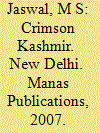

|
|
|
|
|
| Publication |
New Delhi, Manas Publications, 2007.
|
| Description |
320p.
|
| Standard Number |
8170493005
|
|
|
|
|
|
|
|
|
|
|
|
Copies: C:1/I:0,R:0,Q:0
Circulation
| Accession# | Call# | Current Location | Status | Policy | Location |
| 051848 | 303.6250954/JAS 051848 | Main | On Shelf | General | |
|
|
|
|
| 14 |
ID:
135169
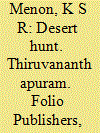

|
|
|
|
|
| Publication |
Thiruvananthapuram, Folio Publishers, 2013.
|
| Description |
241p.Pbk
|
| Standard Number |
9789382356042
|
|
|
|
|
|
|
|
|
|
|
|
Copies: C:1/I:0,R:0,Q:0
Circulation
| Accession# | Call# | Current Location | Status | Policy | Location |
| 058007 | 303.625/MEN 058007 | Main | On Shelf | General | |
|
|
|
|
| 15 |
ID:
176990
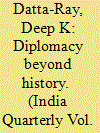

|
|
|
|
|
| Summary/Abstract |
The history of Indian diplomacy conceptualises diplomacy racially—as invented by the West—and restrictively—to offence. This is ‘analytic-violence’ and it explains the berating of Indians for mimicking diplomacy incorrectly or unthinkingly, and the deleting, dismissing, or denigrating, of diplomatic practices contradicting history’s conception. To relieve history from these offences, a new method is presented, ‘Producer-Centred Research’ (PCR). Initiating with abduction, an insight into a problem—in this case Indian diplomacy’s compromised historicisation—PCR solves it by converting history’s racist rationality into ‘rationalities’. The plurality renders rationality one of many, permitting PCR’s searching for rationalities not as a function of rationality but robust practices explicable in producer’s terms. Doing so is exegesis. It reveals India’s nuclear diplomacy as unique, for being organised by defence, not offence. Moreover, offence’s premise of security as exceeding opponent’s hostility renders it chimerical for such a security is, paradoxically, reliant on expanding arsenals. Additionally, doing so is a response to opponents. This fragments sovereignty and abdicates control for one is dependent on opponent’s choices. Defence, however, does not instigate opponents and so really delivers security by minimising arsenals since offence is eschewed. Doing so is not a response to opponents and so maintains sovereignty and retains control by denying others the right to offense. The cost of defence is courage, for instance, choosing to live in the shadow of nuclear annihilation. Exegesis discloses Balakot as a shift from defence to offence, so to relieve the Bharatiya Janata Party’s (BJP) leadership of having to be courageous. The intensity of the intention to discard courage is apparent in the price the BJP paid. This included equating India with Pakistan, permitting it to escalate the conflict, and so imperiling all humanity in a manner beyond history.
|
|
|
|
|
|
|
|
|
|
|
|
|
|
|
|
| 16 |
ID:
099022
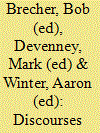

|
|
|
|
|
| Publication |
London, Routledge, 2010.
|
| Description |
viii, 195p.
|
| Standard Number |
9780415488082, hbk
|
|
|
|
|
|
|
|
|
|
|
|
Copies: C:1/I:0,R:0,Q:0
Circulation
| Accession# | Call# | Current Location | Status | Policy | Location |
| 055274 | 363.325/BRE 055274 | Main | On Shelf | General | |
|
|
|
|
| 17 |
ID:
148445
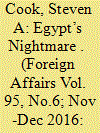

|
|
|
|
|
| Summary/Abstract |
On January 25, 2011, tens of thousands of Egyptians took to the streets, demanding an end to the nearly 30-year rule of President Hosni Mubarak. Eighteen days later, Mubarak stepped down. In Tahrir Square, the crowds cried, “Lift your head high, you’re an Egyptian.” “We can breathe fresh air, we can feel our freedom,” Gamal Heshmat, a former member of parliament, told The New York Times [2]. “After 30 years of absence from the world, Egypt is back.”
|
|
|
|
|
|
|
|
|
|
|
|
|
|
|
|
| 18 |
ID:
123062
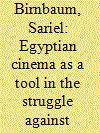

|
|
|
|
|
| Publication |
2013.
|
| Summary/Abstract |
The cinema has been used by Egyptian regimes, from the monarchy until Mubarak, to resist the political agenda of Islamic radicals and terrorists. Edward Said and others describe Islamic terrorists' images in the Western media as "Western fantasies." Nevertheless, for Egyptian intellectuals, terrorists were and remain a stark reality. In Egypt, the entire state apparatus was set in motion to fight Islamic terrorism. The state was unprepared for the massive popular uprising of 2011. While the direction that Egyptian culture will follow after Mubarak remains unclear, an important objective is to study pre-revolutionary Egyptian cinema and to understand its ideological tendencies.
|
|
|
|
|
|
|
|
|
|
|
|
|
|
|
|
| 19 |
ID:
124923
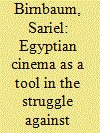

|
|
|
|
|
| Publication |
2013.
|
| Summary/Abstract |
The cinema has been used by Egyptian regimes, from the monarchy until Mubarak, to resist the political agenda of Islamic radicals and terrorists. Edward Said and others describe Islamic terrorists' images in the Western media as "Western fantasies." Nevertheless, for Egyptian intellectuals, terrorists were and remain a stark reality. In Egypt, the entire state apparatus was set in motion to fight Islamic terrorism. The state was unprepared for the massive popular uprising of 2011. While the direction that Egyptian culture will follow after Mubarak remains unclear, an important objective is to study pre-revolutionary Egyptian cinema and to understand its ideological tendencies.
|
|
|
|
|
|
|
|
|
|
|
|
|
|
|
|
| 20 |
ID:
168858
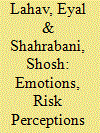

|
|
|
|
|
| Summary/Abstract |
The current field study used unique data collected in Israel in July 2014, during a military operation that the Israel Defence Forces (I.D.F.) conducted in the Gaza Strip, in reaction to the thousands of missiles launched from there into Israel. During this operation, the new Iron Dome anti-missile defence system was used to protect Israelis exposed to missile attacks. The study examined factors that correlate with decisions to comply with I.D.F. defence instructions regarding behaviour during missile attacks. In addition, the study examined the relationship between attitudes towards the Iron Dome technology and emotions, risk perceptions, and the decision to comply with I.D.F. defence instructions. The results indicate that stronger positive opinions towards Iron Dome were correlated with lower levels of fear and anger, and beliefs that participant’s chances of being injured by a missile were lower than they had been during previous military operation. In addition, better compliance with I.D.F. defence instructions correlated with being more fearful, angrier at Hamas, living closer to Gaza Strip, and having more positive opinions about Iron Dome. The findings also indicate gender differences with respect to factors correlated with risk perceptions, opinions regarding Iron Dome, and precautionary actions during attacks.
|
|
|
|
|
|
|
|
|
|
|
|
|
|
|
|
|
|
|
|
|